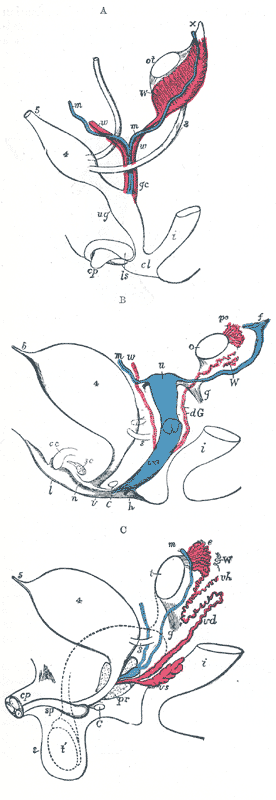List of related male and female reproductive organs
This list of related male and female reproductive organs shows how the male and female reproductive organs of the human reproductive system are related, sharing a common developmental path. This makes them biological homologues. These organs differentiate into the respective sex organs in males and females.
List
| Embryological precursor | Male | Female |
|---|---|---|
| Gonad | Testis | Ovary |
| Paramesonephric duct (Müllerian duct) |
Appendix testis | Fallopian tubes |
| Paramesonephric duct | Prostatic utricle | Uterus, cervix, vagina[1] |
| Mesonephric tubules | Efferent ducts, paradidymis | Epoophoron, paroöphoron |
| Mesonephric duct (Wolffian duct) |
Rete testis | Rete ovarii |
| Mesonephric duct | Epididymis | Gartner's duct |
| Mesonephric duct | Vas deferens | |
| Mesonephric duct | Seminal vesicle | |
| Urogenital sinus | Prostate | Skene's glands |
| Urogenital sinus | Bladder, urethra | Bladder, urethra |
| Urogenital sinus | Cowper's or bulbourethral gland | Bartholin's gland |
| Labioscrotal folds | Scrotum | Labia majora |
| Urogenital folds | Penile skin | Labia minora |
| Genital tubercle | Penis | Clitoris |
| Genital tubercle | Bulb of penis | Vestibular bulbs |
| Genital tubercle | Glans penis | Clitoral glans |
| Genital tubercle | Crus of penis | Clitoral crura |
| Prepuce | Foreskin | Clitoral hood |
| Peritoneum | Processus vaginalis | Canal of Nuck |
| Gubernaculum | Gubernaculum testis | Round ligament of uterus |
Internal organs

Diagrams that show the development of male and female organs from a common precursor
| Embryological precusor | Female | Male |
| 3. Ureter | Ureter | Ureter |
| 4. Urinary bladder | Urinary bladder | Urinary bladder |
| 5. Urachus | Urachus | Urachus |
| i. Lower part of the intestine | i. Lower part of the intestine | i. Lower part of the intestine |
| cl. Cloaca | ||
| cp. Elevation which becomes clitoris or penis (genital tubercle) | cc. Corpus cavernosum clitoridis | cp. Corpora cavernosa penis cut short |
| ug. Sinus urogenitalis | C. Greater vestibular gland, and immediately above it the urethra | C. Bulbo-urethral gland of one side |
| f. The abdominal opening of the left uterine tube | ||
| g. Round ligament, corresponding to gubernaculum | g. The gubernaculum | |
| h. Situation of the hymen | ||
| ls. Labioscrotal folds | l. Labium majus | s. Scrotum |
| n. Labium minus | ||
| m, m. Right and left Müllerian ducts uniting together and running with the Wolffian ducts in gc, the genital cord | m. Müllerian duct, the upper part of which remains as the hydatid of Morgagni; the lower part, represented by a dotted line descending to the prostatic utricle, constitutes the occasionally existing cornu and tube of the uterus masculinus | |
| ot. The genital ridge from which either the ovary or testis is formed. | o. The left ovary | t. Testis in the place of its original formation; t’, together with the dotted lines above, indicates the direction in which the testis and epididymis descend from the abdomen into the scrotum. |
| pr. The prostate | ||
| sc. Corpus cavernosum urethrae | sp. Corpus cavernosum urethrae | |
| u. Uterus. The uterine tube of the right side is marked m. | ||
| v. Vulva | ||
| va. Vagina | ||
| vh. Ductus aberrans | ||
| vs. The vesicula seminalis | ||
| W. Left Wolffian body | W. Scattered remains of the Wolffian body, constituting the organ of Giraldès, or the paradidymis of Waldeyer. | |
| w, w. Right and left Wolffian ducts | W. Scattered remains of Wolffian tubes near it (paroöphoron of Waldeyer); dG. Remains of the left Wolffian duct, such as give rise to the duct of Gärtner, represented by dotted lines; that of the right side is marked w. | |
| po. Epoophoron |
External organs

- A: Undifferentiated
- B: Female
- C: Male
- D: Female
- E: Male
- F: Female
References
- ↑ Cai Y (2009). "Revisiting old vaginal topics: conversion of the Müllerian vagina and origin of the "sinus" vagina". Int J Dev Biol 2009; 53:925-34. 53 (7): 925–34. doi:10.1387/ijdb.082846yc. PMID 19598112.
This article is issued from Wikipedia - version of the 11/5/2016. The text is available under the Creative Commons Attribution/Share Alike but additional terms may apply for the media files.